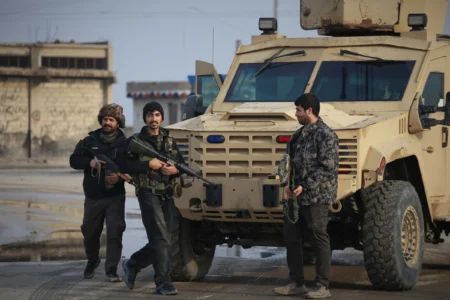Iran has arrested eight people suspected of passing sensitive military information to the Israeli intelligence agency Mossad during a recent 12-day war with Israel and the United States. The Islamic Revolutionary Guard Corps (IRGC) announced the arrests on Saturday, saying the suspects received specialized training from Mossad through online platforms.
The IRGC statement said authorities apprehended the suspects in northeastern Iran before they could carry out their plans. Officials also seized materials that could be used to make launchers, explosives, bombs, and booby traps.
State media reported earlier this month that Iranian police detained up to 21,000 people during the June conflict, though details on the specific alleged offenses were not disclosed.
The war began on June 13 after an Israeli military strike killed senior Iranian military officials, scientists, and hundreds of civilians. In response, Iran launched missile attacks on Israeli military sites, cities, and infrastructure. The United States also carried out strikes on Iran’s nuclear facilities in support of Israel, marking the most significant blow to the Islamic Republic since the Iran-Iraq war of the 1980s.
During the conflict, Iranian authorities intensified street patrols and checkpoints. Citizens were encouraged to report suspicious activity, leading to a wave of arrests. Officials have also accelerated deportations of Afghan refugees and migrants suspected of illegal residency or espionage.
Police spokesperson Saeed Montazerolmahdi said Iranian law enforcement rounded up 2,774 illegal migrants and identified 30 “special security cases” through phone investigations. Authorities also arrested 261 individuals suspected of espionage and 172 for unauthorized filming. Montazerolmahdi did not indicate how many had been released.
Iran has carried out at least eight executions in recent months, including nuclear scientist Rouzbeh Vadi, hanged on August 9 for allegedly passing intelligence about another scientist killed in Israeli airstrikes. Human rights organizations have criticized Iran for using espionage charges and expedited executions as tools for political repression.
The IRGC noted that cybercrime surged during the conflict, with over 5,700 cases of online fraud and unauthorized withdrawals reported. Officials described cyberspace as a crucial battlefield in the war.
The June confrontation ended with a US- and Qatar-brokered ceasefire, but tensions remain high. The IRGC’s arrests and seizures highlight Iran’s ongoing efforts to counter perceived espionage threats while maintaining domestic security amid international conflict.







